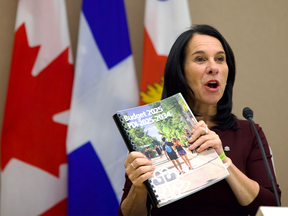Owners of single-family homes will see their bills increase more than the average.

It will be less of a sticker shock for Montrealers when they receive their tax bills, compared with last year.
Montreal Mayor Valérie Plante tabled the last budget of her eight-year mandate Wednesday. The $7.28-billion budget represents an increase in expenses of 4.2 per cent.
The average residential tax bill will increase by 2.2 per cent, while the average non-residential tax bill will rise by 1.9 per cent.
The city is also receiving more money in transfer payments from Quebec — which includes a percentage of the provincial sales tax. It also increased its revenues from fees and special taxes levied on citizens, among them a tax on vacant properties — which is doubling in 2025. The city also received $40 million more from the so-called welcome tax —the amount charged on real estate transactions.
What does this mean for homeowners?
Owners of single-family homes will see their bills increase, since their property values rose. That means an average single-family home is now valued at $720,000 and that home’s property tax bill will rise by 2.9 per cent for an average increase of $135 to $4,747.
The average condo in Montreal is valued at $485,000, and will get a property tax bill of $3,199 — a 1.2-per-cent increase.
The demerged suburbs won’t be spared, and the budget for island-wide services is rising by $111 million compared with last year. However, the portion of those services paid by the suburbs is $568 million, an increase of four per cent from last year.
Among the city’s biggest expenses:
- 18 per cent is for public security.
- 16.3 per cent for payments on the debt.
- 11.2 per cent for general administration.
- 10.5 per cent for public transit.
- 10.1 per cent for culture and leisure.
The city’s payments to the Autorité régionale de transport métropolitain for public transit is increasing by 47.2 million — 6.6 more than last year. The city is also paying $2.3 million more than it expected to allow seniors across the island to ride transit free — a 13-per-cent increase.
Debt financing will cost $27.2 million more in 2025, and the boroughs received an increase to their budgets worth $24.1 million.
The city is also investing $47 million more for housing — in hopes of creating more non-speculative housing, such as social housing units and co-operatives.
Budget cuts
But the budget also includes some cuts to expenses. The city says it has begun an exhaustive process of evaluating all its services and improving their efficiency.
Roughly $29.3 million of cost cuts were found for the financial exercise in 2025. The city’s goal is to chop $200 million in annual recurrent costs from the budget. The city cut 101 jobs in 2024, and plans to keep the staffing level at the central city roughly the same in 2025. In the boroughs, 46 new jobs will be added next year.
Capital works
Along with the budget, the city tabled its $24.8-billion, 10-year capital works program, known as the PDI (Programme décennal d’immobilisations). The biggest expenses in that budget — which is financed generally through long-term loans — are roadwork and water infrastructure. Those will both see $6.5-billion increases over the 10-year period.
Among the long-term projects in the PDI are the Hippodrome development, which will cost $300 million over 10 years.
The city is in the process of outlining a business plan to attract investment from the private sector to pay for the lion’s share of that cost.
The $1.4 billion does not include the cost of building a tramway, which is envisioned for the project.
The PDI also contains no money to pay for a once-promised extension of Cavendish Blvd. That project — promised since the middle of the 20th century — appears to once again be dead in the water.